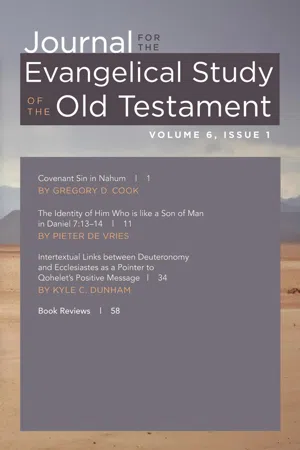
- 106 pages
- English
- ePUB (mobile friendly)
- Available on iOS & Android
Journal for the Evangelical Study of the Old Testament, 6.1
About this book
Journal for the Evangelical Study of the Old Testament (JESOT) is a peer-reviewed journal devoted to the academic and evangelical study of the Old Testament. The journal seeks to fill a need in academia by providing a venue for high-level scholarship on the Old Testament from an evangelical standpoint. The journal is not affiliated with any particular academic institution, and with an international editorial board, open access format, and multi-language submissions, JESOT cultivates and promotes Old Testament scholarship in the evangelical global community. The journal differs from many evangelical journals in that it seeks to publish current academic research in the areas of ancient Near Eastern backgrounds, Dead Sea Scrolls, Rabbinics, Linguistics, Septuagint, Research Methodology, Literary Analysis, Exegesis, Text Criticism, and Theology as they pertain only to the Old Testament. JESOT also includes up-to-date book reviews on various academic studies of the Old Testament.
Frequently asked questions
- Essential is ideal for learners and professionals who enjoy exploring a wide range of subjects. Access the Essential Library with 800,000+ trusted titles and best-sellers across business, personal growth, and the humanities. Includes unlimited reading time and Standard Read Aloud voice.
- Complete: Perfect for advanced learners and researchers needing full, unrestricted access. Unlock 1.4M+ books across hundreds of subjects, including academic and specialized titles. The Complete Plan also includes advanced features like Premium Read Aloud and Research Assistant.
Please note we cannot support devices running on iOS 13 and Android 7 or earlier. Learn more about using the app.
Information
Intertextual Links between Deuteronomy and Ecclesiastes as a Pointer to Qohelet’s Positive Message
| Verbal Correspondences in the “Law of Vows” | |||
| Deut 23:22–23 | Translation | Eccl 5:3–4 | Translation |
| כי־תדר נדר ליהוה אלהיך לא תאחר לשׁלמו כי־דר֙שׁ ידרשׁנו יהוה אלהיך֙ מעמך והיה בך חטא׃ וכי תחדל לנדר לא־יהיה בך חטא׃ | If you make a vow to Yhwh your God, you shall not delay in fulfilling it, for certainly Yhwh your God shall require it from you and it will be sin for you. And if you refrain from vowing, it will not be sin for you. | כאשׁר תד֙ר נדר לאלהים אל־תאחר לשׁלמו כי אין חפץ בכסילים את אשׁר־תדר שׁלם׃ טוב אשׁר לא־תדר משׁתדור ולא תשׁלם | When you make a vow to God, do not delay in fulfilling it, for he takes no pleasure in fools. Fulfill what you vow! It is better that you not vow than that you vow and not fulfill it. |
Table of contents
- Title Page
- Covenant Sin in Nahum
- The Identity of him who is like a Son of Man in Daniel 7:13–14
- Intertextual Links between Deuteronomy and Ecclesiastes as a Pointer to Qohelet’s Positive Message